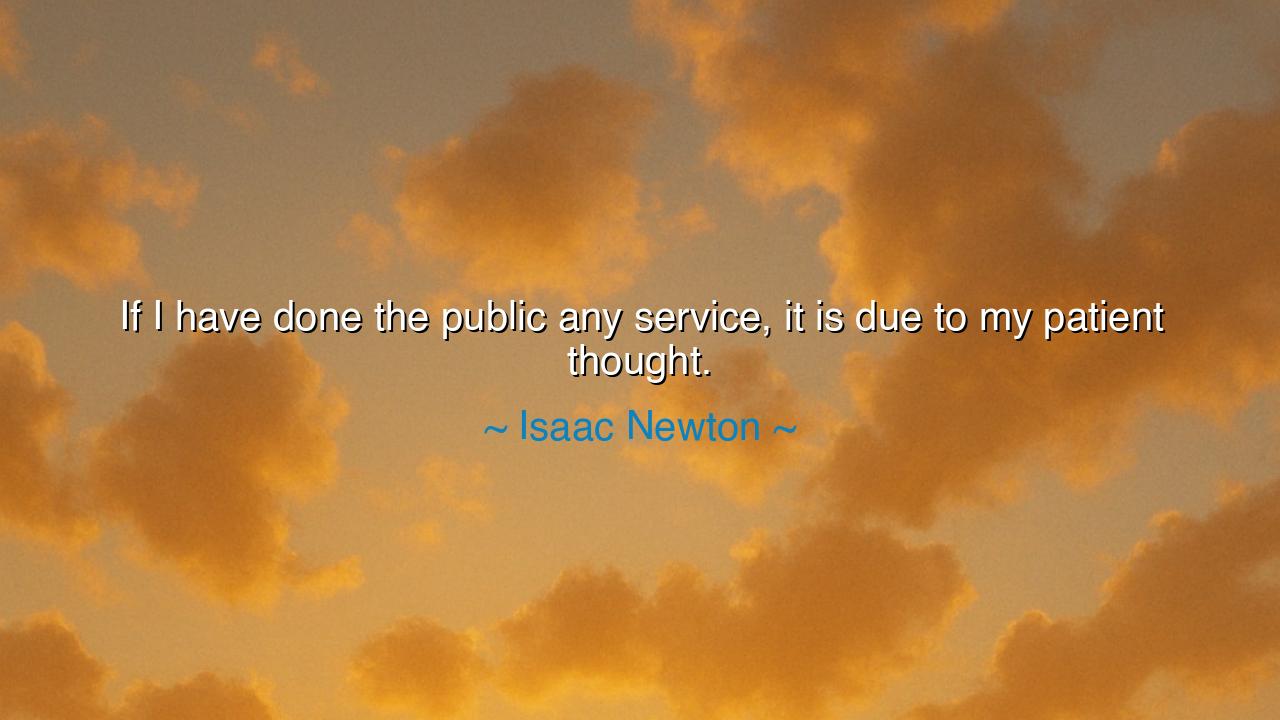
If I have done the public any service, it is due to my patient






The words of Isaac Newton—“If I have done the public any service, it is due to my patient thought”—resound across the centuries like a bell struck in the silence of eternity. They remind us that greatness does not spring from sudden brilliance, nor from the fleeting spark of inspiration alone, but from the long, steady flame of patience. Newton, who gazed into the heavens and deciphered their laws, who bent light into its secret colors, who laid bare the principles of motion and gravity, confessed humbly that all his triumphs were not the fruit of divine genius alone, but of thought endured with patience.
The origin of this declaration lies in the very spirit of Newton’s life. He was not one who leapt quickly to conclusions, nor one who hastened to parade unfinished ideas before the world. Instead, he brooded over problems like a hawk circling its prey, refusing to be distracted, unwilling to surrender until the truth yielded itself. His greatness was not in seeing what others could not see, but in looking longer, with steadier gaze, than others were willing to endure. Here is the root of his service: not brilliance without labor, but labor sustained by patience.
Consider the tale of Newton’s struggle with the laws of celestial motion. For years, he wrestled in silence with the mysteries of the planets, pondering the unseen forces that bound them to their courses. Others guessed, others speculated, but Newton waited—calculating, revising, discarding, beginning again. It was patience that led him at last to the law of universal gravitation, a truth so mighty that it bound together apples falling from trees and stars wandering in the night sky. Without his refusal to abandon the work, humanity might have waited centuries more for such revelation.
This story is not his alone, for across time the greatest discoveries and the noblest deeds are children of patient thought. Think of Thomas Edison, who, when asked about his countless failed attempts to create the lightbulb, replied that he had not failed, but discovered thousands of ways that would not work. It was not brilliance alone, but patient endurance, that finally lit the darkness for all mankind. And so, Newton’s words echo a universal law: it is patience, not speed, that unlocks the doors of lasting achievement.
In a world intoxicated by haste, where men chase after instant success and glory, Newton’s wisdom is a stern reminder. Patience is the forge of greatness. To think patiently is to wrestle with difficulty without despair, to persist in silence while others abandon the task, to labor unseen until the truth or creation emerges like gold purified in fire. The impatient mind gathers dust, but the patient mind gathers truth.
The lesson, then, is as clear as it is demanding: if you would serve others, if you would accomplish something that endures beyond yourself, you must train yourself to endure the weight of thought. Do not flee from difficulty. Do not despise the long night of study. Do not surrender when progress is slow and unseen. For the fruit of patient thought ripens slowly, but once ripe, it feeds generations.
In practice, this means: give yourself to deep work without constant distraction. Set aside time each day for contemplation, for study, for the patient unfolding of ideas. When a problem resists, do not abandon it quickly; return, again and again, until it yields. Embrace stillness, for in stillness thought deepens. Value persistence above speed, substance above appearance, depth above breadth.
Thus let Newton’s words guide us: service to the world is not born of impatience, but of patient thought. If you would carve your name into the memory of mankind, do not seek the thunderclap of sudden brilliance, but the steady fire that endures through years of labor. For it is patience that builds, patience that endures, and patience that leaves behind truths and works that will outlive their maker.






AAdministratorAdministrator
Welcome, honored guests. Please leave a comment, we will respond soon